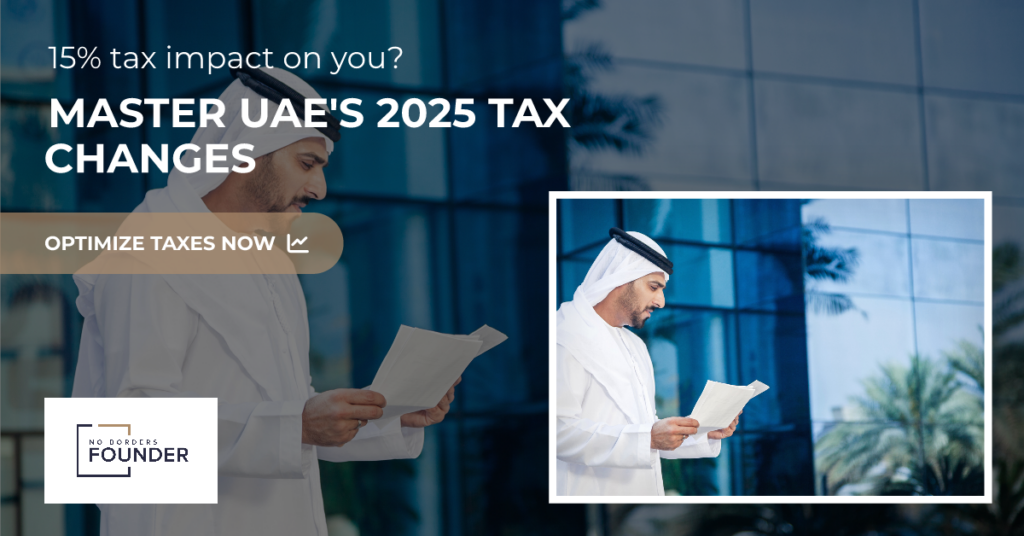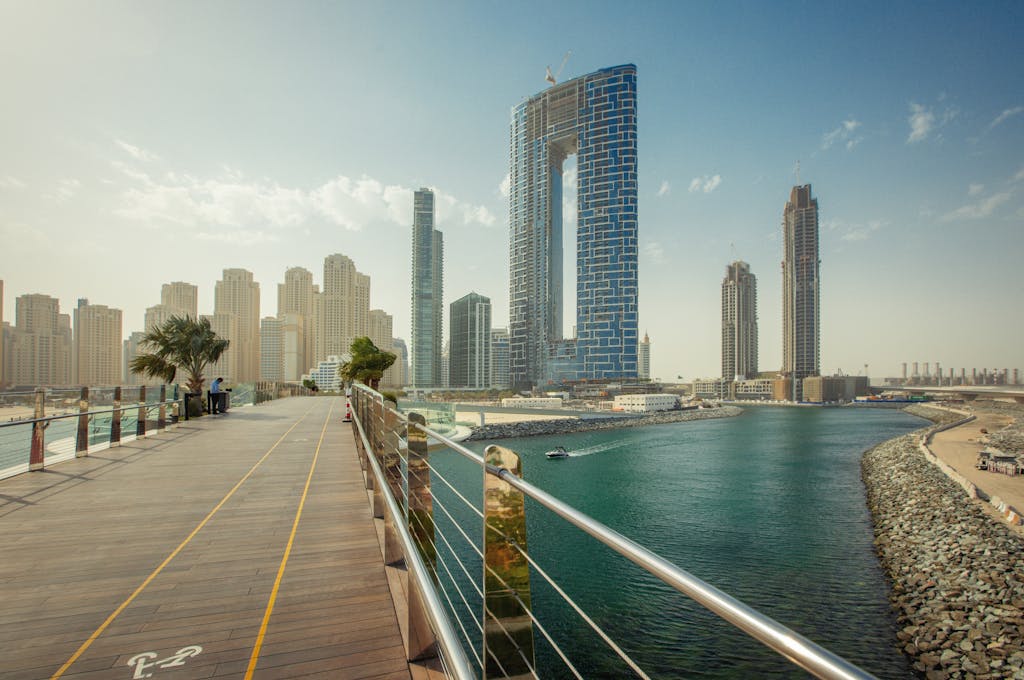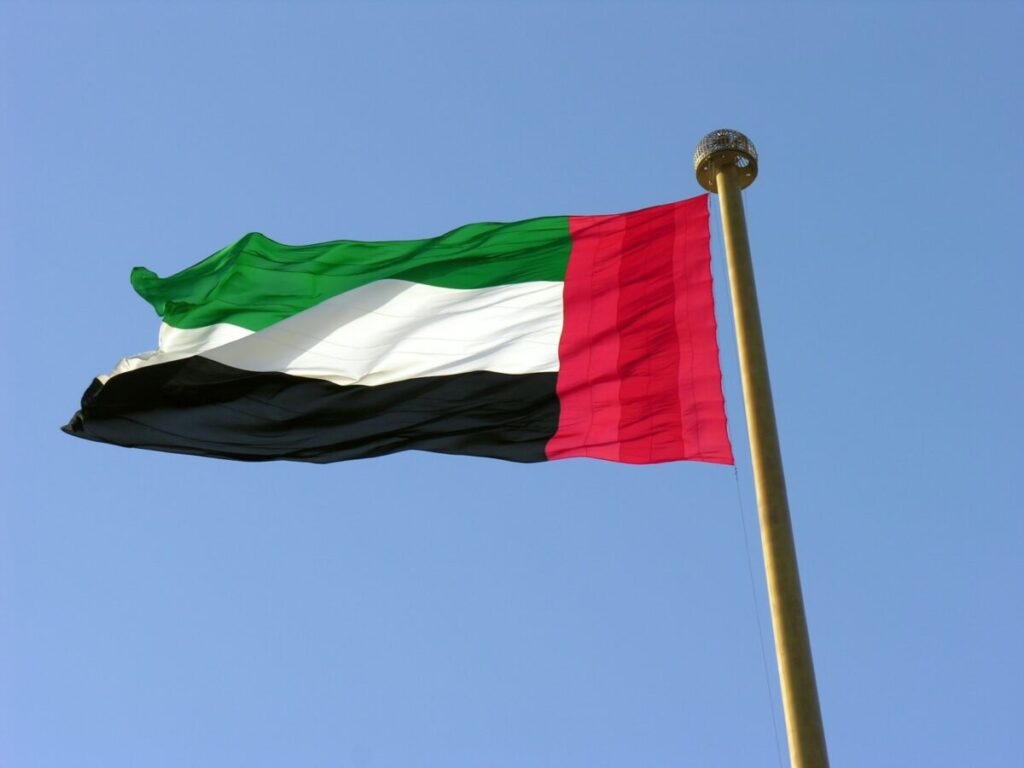The New 15% Tax in the UAE Starting 2025: Revolution or Evolution?
By Alexander Erber, Senior Consultant & CEO of No Borders Founder
02/2025

The United Arab Emirates (UAE) has long been synonymous with a business-friendly environment and low-tax haven. However, the introduction of the 15% Domestic Minimum Top-up Tax (DMTT), effective January 1, 2025, marks a groundbreaking shift in the country’s fiscal landscape. This reform, designed to align with global OECD standards, is set to redefine how multinational corporations (MNCs) operate in the region.
As a seasoned advisor to high-net-worth individuals (HNWIs) and corporate leaders, I see this development as more than a legislative adjustment—it is a transformative moment for both businesses and investors. Let me explain why this reform is not just a challenge but a catalyst for unprecedented opportunities.
1. The 15% Tax: A Turning Point in UAE’s History
The DMTT aims to ensure that companies with global revenues exceeding €750 million in at least two of the last four fiscal years are taxed at a minimum effective rate of 15%. This move signals the UAE’s commitment to global transparency and its readiness to adapt to evolving international norms.
Key Features of the Regulation:
- Applicability: Multinational companies with consolidated revenues exceeding €750 million.
- Supplementary to the 9% corporate tax: Companies pay the difference if their effective tax rate falls below 15%.
- Exemptions: Small and medium enterprises (SMEs) and companies in designated free zones remain largely unaffected.
“This reform underscores the UAE’s commitment to becoming a globally competitive and transparent economic powerhouse. It reflects a forward-thinking approach to balancing local and international interests.” – Alexander Erber
2. Why This Reform Is Necessary
The Global Context
The DMTT is part of the OECD’s “Pillar Two” initiative, which seeks to establish a global minimum tax rate to prevent profit shifting and tax avoidance. Over 140 jurisdictions have committed to this framework, and the UAE’s adoption signals its alignment with international best practices.
Primary Objectives:
- Legitimacy: Strengthen the UAE’s position as a credible global player in the tax and economic landscape.
- Economic Diversification: Redirect tax revenues into non-oil sectors, fueling long-term sustainability.
- Competitiveness: Align with global standards while maintaining its allure as an investment destination.
“The DMTT is more than a fiscal measure; it’s a strategic alignment with global norms, ensuring the UAE remains a preferred hub for multinational enterprises.” – Alexander Erber
3. Implications for Multinational Corporations
The DMTT brings both challenges and opportunities for multinational corporations operating in the UAE.
Challenges:
- Increased Tax Burden: Companies currently benefiting from the 9% corporate tax will face a higher effective tax rate.
- Compliance Complexity: Stricter reporting requirements necessitate enhanced financial systems and expertise.
- Operational Restructuring: Firms may need to reassess their business models to maintain profitability.
Opportunities:
- Enhanced Credibility: Compliance with international norms bolsters corporate reputation.
- New Incentives: The UAE continues to offer significant tax benefits, especially for R&D investments.
- Long-Term Stability: Alignment with global standards enhances investment security.
“Smart companies view challenges as opportunities. This reform is a launchpad for businesses to innovate, adapt, and thrive.” – Alexander Erber
4. The UAE vs. Global Tax Jurisdictions
How the UAE Stacks Up:
Even with the DMTT, the UAE remains competitive compared to other major jurisdictions:
- UAE: 15% (limited to MNCs)
- Singapore: 17%
- Hong Kong: 16.5%
- USA: 21%
- Germany: 30–33%
“Despite the new tax, the UAE’s rates remain attractive, particularly when paired with its strategic location and infrastructure advantages.” – PwC Middle East Analysis
5. Strategies for Tax Optimization
1. Leverage Free Zones:
Designated free zones, such as DMCC and JAFZA, continue to provide substantial tax benefits, shielding businesses from certain aspects of the DMTT.
2. Focus on R&D Investments:
With tax credits of up to 50% on R&D expenditures, innovative firms can significantly reduce their taxable income while driving technological advancements.
“R&D is the cornerstone of future-proof businesses. The UAE rewards innovation with fiscal incentives.” – KPMG Global Insights
3. Attract Top Talent:
New incentives for highly skilled professionals make the UAE a magnet for global expertise.
“The UAE’s talent-focused policies will redefine its workforce landscape, attracting the brightest minds worldwide.” – McKinsey Report 2024
4. Strategic Restructuring:
Segmenting operations and optimizing entity structures can minimize tax exposure while enhancing operational efficiency.
“Forward-thinking companies will not only adapt but thrive under the new regime.” – Alexander Erber
6. Economic Impact on the UAE
Short-Term Effects:
- Revenue Boost: Additional tax income can be reinvested in infrastructure, education, and tech innovation.
- Market Adjustments: SMEs could gain a competitive edge as larger corporations adapt to the new tax landscape.
Long-Term Projections:
- Diversified Economy: Reduced reliance on oil revenues.
- Innovation Hub: Enhanced R&D incentives position the UAE as a global center for technological advancements.
- Sustained Competitiveness: Early adopters of the new standards will gain a reputational edge.
“The DMTT marks a pivotal step in the UAE’s evolution toward a knowledge-based economy.” – Dr. Ahmed Al-Zarooni, Dubai Chamber of Commerce
7. Why Choose No Borders Founder?
Our Unique Value Proposition:
- Proven Expertise: Decades of experience advising HNWIs and global businesses.
- Tailored Solutions: Customized strategies aligned with your specific goals.
- Holistic Approach: From tax optimization to wealth management, we cover it all.
“Our clients trust us because we deliver results, not just advice.” – Alexander Erber
Success Stories:
- Tech Giant Restructuring: Helped reduce effective tax rates by 30% through strategic R&D investments.
- Family Business Optimization: Boosted profitability by 15% within a year through free zone utilization.
8. The UAE in 2030 and Beyond
A Visionary Future:
- Global Innovation Engine: Tax incentives and strategic investments will solidify the UAE’s role as a tech and innovation leader.
- Economic Resilience: Diversification reduces oil dependency, ensuring stability amid global volatility.
- Talent Magnet: Policies attracting top global talent will make the UAE a hub for excellence.
“The UAE is setting a new standard for economic sustainability and innovation.” – Alexander Erber
9. Act Now: Your Strategic Advantage Awaits
The introduction of the DMTT is a call to action for businesses to rethink, restructure, and realign their strategies. Those who act decisively will not only overcome challenges but also seize new opportunities for sustainable growth.
Contact No Borders Founder Today:
Let us guide you through this transformative era. With our unparalleled expertise and personalized approach, we’ll help you navigate the complexities of the new tax regime and secure your place in the UAE’s future.
“Success isn’t accidental; it’s the result of strategic decisions. Let’s make yours count.” – Alexander Erber



